Photo Credit: acciarini ||Sometimes a good conversation elucidates a matter…
Q: What defines a safe asset?
A: My, but that is a broad question. Do you have something more specific that you are trying to answer?
Q: Well, I’ve heard that the wealthy often invest their excess assets in real estate. It seems perfect. As Twain said, “Buy land, they aren’t making any more of it.” It provides income, and protects against inflation.
A: Do you own the land free and clear, or did you have to borrow to own it?
Q: I don’t own any land, aside from my house, and yes, I have a mortgage there. Why are you asking this?
A: Do you remember the financial crisis 2008-2011?
Q: Yes, but why does that matter?
A: Many people had paid a lot for their homes, and were stretched in making mortgage payments. Then one of the Ds hit.
Q: Ds?
A: As written by one wordy blogger:
3) As housing prices fall, which they should because housing is in oversupply, more homeowners find themselves in trouble. Remember, defaults occur because a property is underwater, and one of the five Ds hits:
- Divorce
- Disability
- Death
- Disaster
- Dismissed from employment
Q: My, but he is a piece of work. So, houses aren’t a safe asset?
A: Well, most of the time they are, particularly if don’t have any debt on them. But there are situations where housing prices have been bid up to where the prices don’t justify the cash flows if you are borrowing to own it and are renting it out.
Q: What do you mean?
A: No asset’s price can survive if the implicit net rent is negative. I.e., if you have to feed the property to hold it.
Q: Huh?
A: Imagine that instead of living in your home, you borrowed money to buy the house, and have rented it out. What I am saying is that when those that do this are losing money, the price of the house is too high. They are relying on price appreciation to bail them out, and no one can control that.
Q: Is there a simpler way to say this?
A: When you have to give up money to hold onto an asset, you are in a weak position, and it means you should sell, particularly if many people are having to do the same thing. Properly priced assets produce cash; they don’t consume cash. If on net it is cheaper to rent than borrow and own, then it is probably better to rent.
Q: Are you just saying that risk is a function of the price of the asset? An overpriced asset is risky, and an underpriced asset is not?
A: I am saying that, but there is more to say as well. An asset could be priced below its fair market value, and it could still be risky if it is misfinanced. Take for example the insurance company General American back in August 1999.
Q: Huh?
A: Old news, I know, and most people don’t follow insurers. But they had written a lot of floating rate GICs terminable at par in 7 days if they got a ratings downgrade. What was safe if it had only been 5% of their assets became toxic at 25% of their assets. The amount they were selling ballooned because money market funds could treat the assets as short-term paper.
Once the downgrade came, there was no way to raise that much money so fast. They ended up selling out to MetLife for 50% of their net worth. MetLife picked up control of one of their subsidiaries, RGA, in the process. They made exceptionally good money on that purchase.
It’s like crossing a stream that is 3 feet deep on average, but there is a spot in the middle that is 20 feet deep. If you can’t swim, don’t cross it.
Q: I heard you wrote to Cramer about General American at the time.
A: Yes, that was my first email to him, and I explained the situation in such detail that he republished the email for readers. That was my introduction to Cramer.
Q: So, you are saying there are two things to safety — price and financing?
A: That’s all I’ve said so far, but there are a few other things. The character of management matters. Remember my piece, Dead as a Severed Horse?s Head?
Q: Oh, the zinc miner that sided with the bondholders against the shareholders?
A: Exactly. With better management, they could have skated through the troubles, and perhaps sold the company to a larger base metals miner like BHP.
Q: Is any of this similar to the losses you took on Scottish Re or National Atlantic?
A: Yes. I thought you were my friend, though.
Q: Well, I read your confession pieces on both of them.
A: It still hurts, but faithful are the wounds of a friend.
Q: Proverbs 27:6, I like it.
A: I still remember the stress and the losses.
Q: Then is that all? Price, leverage, and management?
A: Pretty much. There are some secondary matters to those who do not want to do the hard work. Companies that pay dividends and buy back stock are shareholder friendly, and that is good so long as they don’t borrow too much to do that.
Also, there are the issues of operating leverage — companies with low fixed costs are safer. But that’s about it, unless you want to talk about investments other than stocks.
Q: Can we take this up later?
A: Sure, let’s take this up in part 2.


2 thoughts on “What Makes An Asset Safe?”